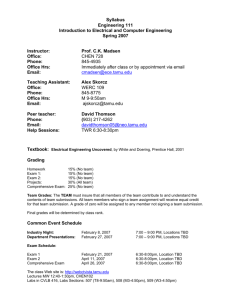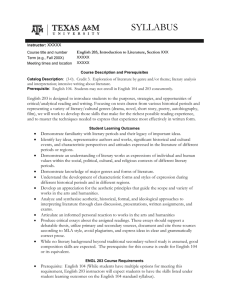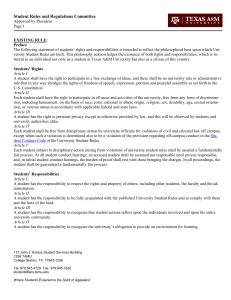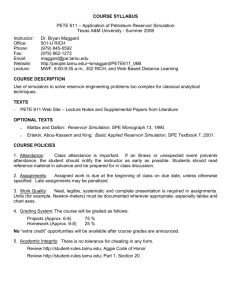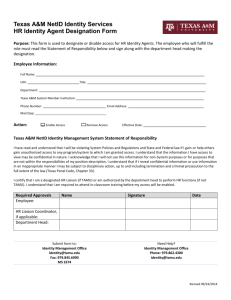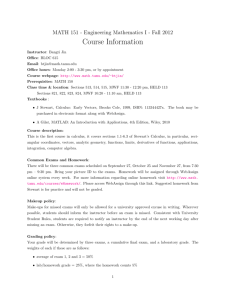syllabus - Department of English
advertisement
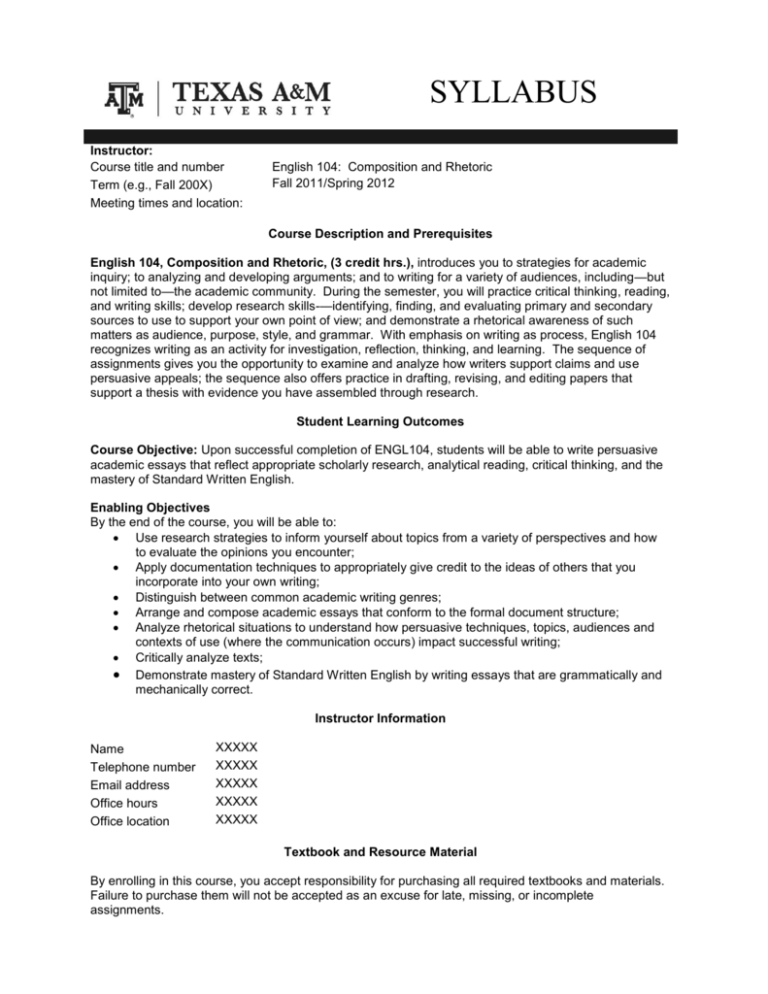
SYLLABUS Instructor: Course title and number Term (e.g., Fall 200X) Meeting times and location: English 104: Composition and Rhetoric Fall 2011/Spring 2012 Course Description and Prerequisites English 104, Composition and Rhetoric, (3 credit hrs.), introduces you to strategies for academic inquiry; to analyzing and developing arguments; and to writing for a variety of audiences, including—but not limited to—the academic community. During the semester, you will practice critical thinking, reading, and writing skills; develop research skills-—identifying, finding, and evaluating primary and secondary sources to use to support your own point of view; and demonstrate a rhetorical awareness of such matters as audience, purpose, style, and grammar. With emphasis on writing as process, English 104 recognizes writing as an activity for investigation, reflection, thinking, and learning. The sequence of assignments gives you the opportunity to examine and analyze how writers support claims and use persuasive appeals; the sequence also offers practice in drafting, revising, and editing papers that support a thesis with evidence you have assembled through research. Student Learning Outcomes Course Objective: Upon successful completion of ENGL104, students will be able to write persuasive academic essays that reflect appropriate scholarly research, analytical reading, critical thinking, and the mastery of Standard Written English. Enabling Objectives By the end of the course, you will be able to: Use research strategies to inform yourself about topics from a variety of perspectives and how to evaluate the opinions you encounter; Apply documentation techniques to appropriately give credit to the ideas of others that you incorporate into your own writing; Distinguish between common academic writing genres; Arrange and compose academic essays that conform to the formal document structure; Analyze rhetorical situations to understand how persuasive techniques, topics, audiences and contexts of use (where the communication occurs) impact successful writing; Critically analyze texts; Demonstrate mastery of Standard Written English by writing essays that are grammatically and mechanically correct. Instructor Information Name Telephone number Email address Office hours Office location XXXXX XXXXX XXXXX XXXXX XXXXX Textbook and Resource Material By enrolling in this course, you accept responsibility for purchasing all required textbooks and materials. Failure to purchase them will not be accepted as an excuse for late, missing, or incomplete assignments. Rebecca Moore Howard. Writing Matters: A Handbook for Writing and Research. New York: McGraw Hill, 2011. (NOTE: We will be using the electronic version of this text, which will be available for purchase either through the bookstore or directly from our course website. Wait to purchase until after the first class meeting for final details.) Williams, Joseph M. and Gregory G. Columb. Style: Lessons in Clarity and Grace. 10th ed. New York: Pearson, 2010. Gerald Graff and Cathy Birkenstein. They Say/I Say: The Moves that Matter in Academic Writing. New York: Norton, 2010. M. Jimmie Killingsworth, Appeals in Modern Rhetoric: An Ordinary Language Approach. Carbondale: Southern Illinois UP, 2005. Print. Steven D. Levitt and Stephen J. Dubner. Freakonomics: A Rogue Economist Explores the Hidden Side of Everything. Revised and Expanded ed. New York: William Morrow—Harper Collins, 2005.Print. Barry Scheck, Peter Neufeld and Jim Dwyer: Actual Innocence: When Justice Goes Wrong and How to Make it Right. New York: New American Library, 2003. TAMU E-mail account Additional resources will be available on the course companion website (you will receive an email sent to your TAMU email address during the first week of class with the url and login key). It is your responsibility to keep up with returned graded Writing Projects. If you file a grade appeal at the end of the semester, you are required to submit all graded papers for the course. Grading Policies Criteria for Grade Determination Assessment Category Grammar and Mechanics Exercises Homework and In-class Activities Writing Project 1: Annotated List of Works Cited Writing Project 2: Comparative Analysis Essay Writing Project 3: Rhetorical Analysis Essay Writing Project 4: Argumentative Research Essay Total Percentage of Grade 5% 15% 15% 20% 20% 25% 100% Grading Scale: A (100-90); B (89-80); C (79-70); D (69-60); F (59-0) Grades are not negotiable. Your final course grade will be based on your work in the course. If you are concerned about a grade, see me during office hours. Writing Projects. There are two steps you must follow to submit your major writing projects. You will (1) submit an electronic copy of each Writing Project to Turnitin.com (for more information on Turnitin.com, see “Other Pertinent Course Information” below). (2) submit an electronic copy of each Writing Project to your personal account on MHConnectLearning (for more information on MHConnectLearning.com, see “Other Pertinent Course Information” below). Your papers will be graded online, and you will be able to see my comments via the web interface. After I return a paper, I’ll be glad to discuss it with you after you have had sufficient time to read and reflect on my comments. To protect your privacy, University rules prohibit instructors from discussion student grade issues via email. Plan on making an appointment for a conference or drop by during regular office hours. Paper Format. Papers must be typed on a computer and formatted according to MLA referencing guidelines. A guide to MLA formatting style is available in Writing Matters: A Handbook for Writing and Research. Also, you will be taught how to use MLA style in Unit 1 of the course. Late Papers. You are required to submit assignments to me electronically on due dates listed on this syllabus. Late submission of Writing Projects #1-#4 will result in a deduction of 10 percent of the grade per day. You are responsible for presenting appropriate documentation to excuse late work. If you do not submit appropriate written documentation, you will have points deducted for late submission (10% of the total grade for each day). Peer Review Makeup. Writing classes function on the basis of community; therefore, the entire class’ experience depends upon the participation of each person. If you come to class on peer workshop days without a completed draft, you will not be prepared to participate in peer review and will not receive the benefit of peer editing, which is mandatory and difficult to make up outside of class. If you miss in-class peer review, arrange for peer feedback with your group members outside of class time. It is unacceptable to submit peer workshop feedback sheets that have been filled out by anyone not enrolled in your section of English 104. Grade of I. You should not assume that you may "take an incomplete" in this course. TAMU Student Rules provide guidelines for assigning a grade of I. Requests for Incompletes should be addressed to Dr. Jim Baker, Director of Writing Programs. Your college advising office will be contacted to verify your reason for requesting a grade of I. Requests will be considered only if you have a grade of C or above, a record of good attendance prior to illness or emergencies, and only if you have completed 60% of the work in the course. Mid-Semester Grades. Grades reported at mid-semester will be based on Writing Project 1, Writing Project 2, homework, quizzes, and in-class assignments. This is not 50% of your final grade. Appropriate Attribution. Any assignment that includes sources but fails to include clear and appropriate attribution of those sources will receive a grade of zero (“0”). Acknowledging Assistance. Peer review drafts will include notations from your classmates; otherwise, any handwritten notes on drafts must be in your writing, and all drafts and supporting documents must be your writing—that is, your ideas and your words. If you work with a tutor, plan on discussing your writing, but let the tutor know that all writing must be your own. Cover memos submitted with each writing project will acknowledge the assistance of anyone who contributed to your paper—for example, your peer review group or your roommate. Any paper that shows evidence of assistance and fails to acknowledge that assistance will be considered a violation of the Aggie Honor Code and will be reported as a case of scholastic dishonesty. E-mail and Fax. I will not discuss grades on e-mail and, unless otherwise specified, I will not accept assignments attached to e-mail messages. The English Department will not accept papers or excuses for missing class faxed to instructors. Attendance It is your responsibility to attend the section in which you are officially registered. Neither purchase of textbooks nor completion of assignments is a valid reason to continue attending the wrong section. Because English 104 calls for daily practice in class and out, it is difficult to make up work for extended absences. Writing Programs stands firm on the expectation that students attend class and submit all assignments in the sequence they are assigned in accordance with the deadlines listed in the course syllabus or announced in class. Failure to do so will result in a grade of F: See TAMU Student Rule 7. Authorized Absences You are responsible for providing evidence to substantiate "authorized absences." If you know in advance that you will miss a class, you are responsible for informing me. I will take attendance and enter the number of absences on the final roster. See TAMU Student Rules for an explanation of authorized absences. Excessive unexcused absences (more than three) will be reported to your college advising office and will result in the final course grade being lowered one letter grade. For excessive excused absences (three weeks or more, fall and summer terms; five class meetings, summer term), I will recommend that you see your academic advising office about the options outlined in TAMU Student Rule 7.6. You are expected to meet in class according to the times published in the fall/spring schedule of classes. To have credit for attendance, students who arrive in class after attendance is checked (first five minutes) must provide evidence (memo and documentation) to substantiate their late arrival. For injury or illness less than three days, you must submit “confirmation of visit to a health care professional affirming date and time of visit.” (See TAMU Student Rule 7.1.6.2) For injury or illness of three or more days, you must submit a “medical confirmation note from . . . [your] medical provider. The Student Health Center or an off-campus medical professional can provide a medical confirmation note only if medical professionals are involved in the medical care of the student. The medical confirmation note must contain the date and time of the illness and medical professional’s confirmation of needed absence.” (See TAMU Student Rule 7.1.6.1) Course Topics, Calendar of Activities, Major Assignment Dates (NOTE: Exact dates for Lessons and associated reading assignments are available on the Moodle course website.) Week 1 Topic UNIT 1: Annotated List of Works Cited Course Introduction, MLA Documentation and Formatting 2 Introduction to Research, Planning for Academic Research, Using the Library, Conducting Webbased Research, Evaluating Sources 3 Summarizing and Paraphrasing, Finalizing Writing Project 1 Annotated List of Works Cited 4 UNIT 2: Comparative Analysis Essay Organizing Academic Papers, Sentences and Clarity 5 Sentences and Grace, Thesis Sentences, Writing Introductions Required Reading Writing Matters: “Formatting a Paper in MLA Style” (Chapter 17d online); “Writing Responsibly in the Information Age” (Section 1, Chapter 1 online). Writing Matters: “Planning a Research Project” (Chapter 12 online); “Finding Information” (Chapter 13 online); “Evaluating Information” (Chapter 14 online) They Say/I Say: Part 1, "They Say" Writing Matters: “Using Information Responsibly: Taking Notes and Avoiding Plagiarism” (Chapter 15 online); “Organizing Your Ideas” (Chapter 3, Section 3b online) Style: Lessons in Clarity and Grace: Lesson 3, “Actions” and Lesson 4, “Characters” Writing Matters: “Crafting an Effective Thesis” (Chapter 3, Section 3a online) Style: Lessons in Clarity and Grace: Lesson 5 “Cohesion and Coherence,” Lesson 6 “Emphasis,” Lesson 7 “Concision,” Lesson 8 ”Shape,” and Lesson 10, “Motivating Coherence 6 7 Writing Conclusions, Paragraphing, Editing and Revision UNIT 3: Rhetorical Analysis Essay Introduction to Rhetoric, Rhetorical Appeals, Motive 8 Stasis Theory, Appeals Through Narrative, Enthymemes, Common Sense Logic 9 Psychosocial Connections, Rhetorical Genre Theory, Audience Analysis 10 11 12 Rhetorical Fallacies Finalizing Writing Project 3 UNIT 4: Argumentative Research Paper Analytical Reading, Shaping Perceptions, Guided Research Project Introduction Research Groups (Journalism & Video), Applying Stasis Theory, Authority and Evidence 13 Research Groups (Dissenting Opinions), Junk Science, Research Groups (Court Documents and Arson Reports) 14 & 15 Research Groups (Original Newspaper Reports), Finalizing the Argumentative Research Essay Style: Lessons in Clarity and Grace: Lesson 11, “Global Coherence” Appeals in Modern Rhetoric: Chapter 3 "Rhetorical Situations"; Chapter 1 "A General Introduction to Rhetorical Appeals" Freakonomics: “An Explanatory Note,” “Preface,” and “Introduction”; “The Probability that a Real-Estate Agent is Cheating You (and Other Riddles of Modern Life)” pg. 196; Chapter 1: “What Do Schoolteachers and Sumo Wrestlers Have in Common?” Appeals in Modern Rhetoric: Chapter 10 "Appeal of Narrative" Freakonomics: Chapter 2: “How is the Ku Klux Klan Like a Group of Real Estate Agents?”; Chapter 3: “Why Do Drug Dealers Still Live with Their Moms?”; Chapter 4: “Where Have All the Criminals Gone?” Freakonomics: Chapter 5: “What Makes a Perfect Parent?”; Chapter 6: “Perfect Parenting, Part II” and the “Epilogue” Writing Matters: “Analyzing Your Writing Situation” (Chapter 2, Section 2a online) Online Reading: Rhetorical Fallacies Actual Innocence: Chapter 1: "An Innocence Project," and Chapter 4: "False Confessions"; Chapter 3: "Seeing Things" Online Readings: Journalism and Video They Say/I Say: Chapter 11, "I Take Your Point" Appeals in Modern Rhetoric: Chapter 2 “Appeals to Authority and Evidence" Actual Innocence: “Introduction” and Chapter 6: "Snitch"; Chapter 2 "An Invention"; Chapter 5 "White Coat Fraud"; Actual Innocence: Chapter 7 "Junk Science"; Chapter 8 "Broken Oaths"; Chapter 9 "Sleeping Lawyers" Online Readings: Dissenting Opinions; Court Documents and Arson Reports They Say/I Say: Part 2, "I Say"; Part 3 "Tying it All Together" Online Readings: Original Newspaper Reports. They Say/I Say: Chapter 13, “The Data Suggests” and Chapter 14, "Analyze This" Due Dates for Major Assignments (NOTE: Exact due dates for Major Writing Assignments are available on the Moodle course website.) Major Writing Assignment Writing Project 1: Annotated List of Works Cited Writing Project 2: Comparative Analysis Essay Writing Project 3: Rhetorical Analysis Essay Writing Project 4: Argumentative Research Essay Week Due Week 3 Week 6 Week 11 Week 15 Other Pertinent Course Information You are responsible for being familiar with the Writing Program’s policies <http://wwwenglish.tamu.edu/ index.php?id=737> and with Texas A&M Student Rules <http://student-rules.tamu.edu>. If you have questions, see your instructor or come to the Writing Programs Office, Blocker 234. Group Work. If group work is assigned outside of class, you should meet on University premises. The Sterling C. Evans Library provides areas for group study. To make group work efficient and productive, all members should exhibit professional behavior and remain on task—that is, everyone should work on the project at hand. Classroom Behavior. Disruptive classroom behavior is defined as anything that would interfere with "an instructor's ability to conduct the class" or "the ability of other students to profit from the instructional program." TAMU Student Rules explicitly prohibit disruptive behavior. Moodle This course has a companion website hosted on the English Department’s Moodle Learning Management System. It is important for you to access the Moodle page on a regular basis because it will be the place where you will: See the class assignment calendar to keep up with your reading and homework assignments. Download additional course materials, like handouts, reading materials and homework assignments. Access WHConnectEnglish.com and Turnitin.com to submit your Major Writing Projects for grading. Upload homework assignments for grading. Check your grades using the online grade book. Check your attendance using the online attendance tool. Access guided research materials for your final Writing Project. By the first day of class, you will receive an email from your instructor via your TAMU email account with instructions for accessing Moodle, an enrollment key that you’ll need to gain access to your section’s website, and an assignment for you to complete.To access Moodle: Open a web browser and go to http://moodle.english.tamu.edu/ Click on the link for the current semester Enter your netid and password Click on the link for 104 Sections Find your instructor’s name and your section number and click the link The first time you log in, you’ll need an enrollment key (it will be in the email from your instructor). MHConnectEnglish.com MHConnectEnglish.com is a companion website that comes with your required online textbook, Writing Matters: A Handbook for Writing and Research. In addition to the ebook, you also gain access to a number of tools that you’ll be using this semester, including a grammar diagnostic that you’ll complete the first week of class. MHConnectEnglish is also where your major writing projects will be graded by your instructor. It’s important for you to be able to access the Writing Matters ebook and MHConnectEnglish.com as soon as possible. You can either purchase an access card in the University Bookstore, or you can buy it online directly from the publisher. There’s a link on your course Moodle web page where you can do so if you wish. Turnitin.com Turnitin is an Internet-based service that allows students and instructors to check papers for plagiarism. When you submit a paper to Turnitin, the program checks it against online sources and a database that includes books, journals, and online paper-selling services. Then the program sends your instructor a report, highlighting any passages that appear in other sources. If you’ve done your own work, your instructor will be the only person with access to your paper. You maintain intellectual property rights to your work. You will access Turnitin.com via the Moodle course page for your section. About a week prior to a major writing assignment coming due, a link will appear on Moodle that you can click on to upload your paper. Turnitin recognizes most common word processing program files, such as MS Word. If you work according to the class schedule, you’ll have the opportunity to submit papers to Turnitin before you submit them for a final grade, so think of this program as a safety net. One of the primary skills you’ll be learning in this class is how to document research sources appropriately, and Turnitin is primarily a tool to help you check your work. Scholastic honesty is important—extremely important. If you know in advance that you have problems with the fair and appropriate attribution of sources, you must take the responsibility of addressing the situation and learning how to acknowledge when you borrow the words and ideas of other writers; in other words, tell your instructor about it BEFORE your paper is due so he or she can help you learn to correct the problem. If you fail to do so, then Turnitin will alert your instructor that you may have committed plagiarism, and that could lead to you receiving a zero for a major assignment, or an F in the course. The University Writing Center The University Writing Center (UWC) offers undergraduate students one-on-one help at any stage of the writing process. Located on the second floor of the Sterling C. Evans Library (Suite 1.214) and on the second floor of the West Campus Library, the UWC also offers online assistance and computer-based lessons. See their Web page < http://writingcenter.tamu.edu> for details and hours of operation. Handouts. The handouts used in this course are copyrighted. “Handouts" are all materials generated for this class, which include but are not limited to exams, quizzes, syllabi, in-class materials, sample papers, and peer critique sheets. Because these materials are copyrighted, you do not have the right to copy handouts, unless your instructor expressly grants permission. Electronic Devices. As a courtesy to your classmates and to me, turn off all electronic devices before class starts. Evans Library Your English 104 Evans Learning and Outreach Librarian is Lea Susan Engle, Evans Library Annex, Room 418 D. Americans with Disabilities Act (ADA) The Americans with Disabilities Act (ADA) is a federal anti-discrimination statute that provides comprehensive civil rights protection for persons with disabilities. Among other things, this legislation requires that all students with disabilities be guaranteed a learning environment that provides for reasonable accommodation of their disabilities. If you believe you have a disability requiring an accommodation, please contact Disability Services, in Cain Hall, Room B118, or call 845-1637. For additional information visit http://disability.tamu.edu Academic Integrity For additional information please visit: http://aggiehonor.tamu.edu/ “An Aggie does not lie, cheat or steal, or tolerate those who do.” The Honor Code, based on the long-standing affirmation that “An Aggie does not lie, cheat, or steal or tolerate those who do,” is fundamental to the value of the A&M experience. Upon accepting admission to Texas A&M University, a student immediately assumes a commitment to uphold the Honor Code, to accept responsibility for learning, and to follow the philosophy and rules of the Honor System. Students will be required to state their commitment on examinations, research papers, and other academic work. Ignorance of the rules does not exclude any member of the TAMU community from the requirements or the processes of the Honor System. Information about the Honor Council Rules and Procedures is available online: http://aggiehonor.tamu.edu/ During the semester, you will be expected to sign the following statement as you hand in papers, quizzes, and exams: "On my honor, as an Aggie, I have neither given nor received unauthorized aid on this academic work." Scholastic Dishonesty. It is your responsibility to know the Aggie Honor Code and to understand what constitutes scholastic dishonesty and to avoid it at all costs. Anything (homework, quizzes, daily work, papers, and exams) that appears to be a violation of the Aggie Honor Code will be reported to the Aggie Honor System Office.
